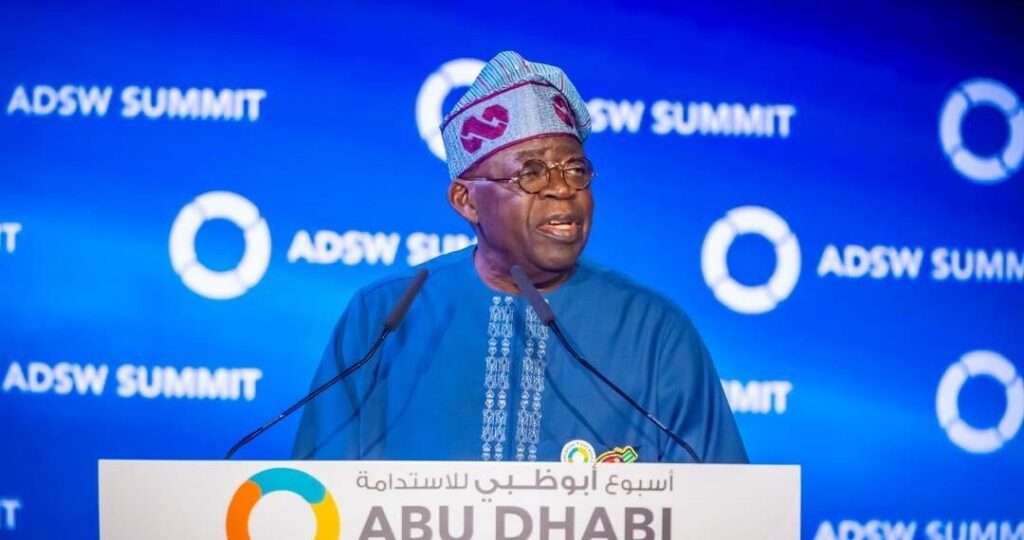Nigeria’s President, Bola Ahmed Tinubu, has reiterated the country’s commitment to achieving net-zero carbon emissions by 2060 during his speech at the 2025 Abu Dhabi Sustainability Week (ADSW).
In his speech titled “From Climate Imperatives to Economic Prosperity: Bringing Africa Into the Future of Global Energy,” President Tinubu highlighted Nigeria’s strategy for energy transition, climate resilience, and sustainable development as the cornerstone of the nation’s journey toward a greener future.
“Our efforts are anchored on three pillars – energy transition, climate resilience, and sustainable development.
“From the inception of my administration, we have recognized the importance of reducing carbon emissions and ensuring a just transition to clean and renewable energy while promoting environmental sustainability and economic growth.”
President Bola Ahmed Tinubu
President Tinubu emphasized the necessity of adapting to climate challenges while ensuring sustainable livelihoods for vulnerable communities. He pledged that Nigeria’s strategy would incorporate measures to safeguard people, infrastructure, and industries against the adverse effects of climate change.
Balancing environmental objectives with economic growth, the administration aims to ensure that the energy transition fosters equitable development across the nation, particularly for communities heavily reliant on fossil fuels.
President Tinubu highlighted ongoing investments in sustainable energy infrastructure, such as the development of Compressed Natural Gas (CNG) systems and electric vehicles (EVs). These initiatives are key components of Nigeria’s plan to accelerate its transition to clean energy while reducing greenhouse gas emissions.
“We are developing the infrastructure to utilize Compressed Natural Gas and electric vehicles,” Tinubu said, underscoring Nigeria’s focus on fostering innovation and creating green jobs.
In addition to clean energy technologies, the President announced significant investment in the exploration and export of critical minerals essential for the global energy transition.
“Nigeria is also investing substantially in energy generation through the exploration of efficient and internationally certified data required to export our solid minerals and critical metals in support of the green transition.”
President Bola Ahmed Tinubu
By leveraging its rich deposits of lithium, cobalt, and other critical metals, Nigeria aims to position itself as a key player in the global clean energy supply chain.
Call for Global Collaboration

President Tinubu also called for international cooperation to bolster Nigeria’s efforts to achieve its net-zero ambitions.
“We must foster global collaboration to ensure that no nation is left behind in the fight against climate change.
“Financial assistance, technology transfer, and capacity building are critical for developing countries to meet their climate goals.”
President Bola Ahmed Tinubu
The President’s remarks resonated with the overarching theme of the 2025 ADSW, which emphasizes accelerating sustainable development and advancing socioeconomic progress through innovation and global partnerships.
While pursuing ambitious climate objectives, Nigeria remains focused on ensuring that the energy transition promotes economic growth and equitable development. Tinubu’s administration is keen on implementing a “just transition,” ensuring that communities and industries traditionally reliant on fossil fuels are not left behind in the shift toward renewable energy.
The President acknowledged the complexities of balancing climate action with socioeconomic progress, particularly in a developing country context. He emphasized the need for inclusive policies and measures that support local industries while advancing environmental goals.
Tinubu’s reaffirmation of Nigeria’s net-zero commitment at the 2025 ADSW marks a pivotal moment in the nation’s climate journey. The outlined strategies highlight a balanced approach, integrating environmental goals with economic priorities and emphasizing global collaboration.
As Nigeria moves forward, the success of its climate agenda will depend on sustained political will, effective policy implementation, and active engagement with international partners.
Harnessing its natural and human resources, Nigeria has the potential to lead Africa into a greener, more sustainable future while contributing meaningfully to global climate action.
In Tinubu’s words, “Our energy transition is not just a policy; it is a commitment to building a sustainable future for Nigeria and the world.”
READ ALSO: Chapo’s Controversial Swearing-In Sparks Tension in Mozambique




















